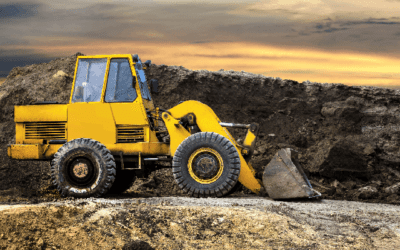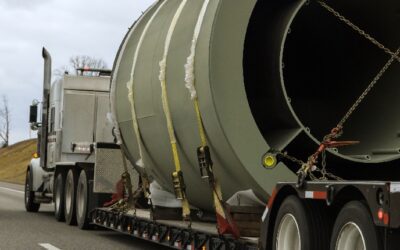Shipping Heavy Machinery: 6 Cost-Saving Tips
At some point, your company could take on a construction project in another part of the country. And while that’s good news for the business, it presents you with the issue of getting your machinery from its current location to the job site without incurring enormous heavy equipment transportation costs.
You’re right to feel concerned about the transportation costs of heavy equipment since these can add up considerably unless you take steps to control them proactively. Shipping a heavy piece of equipment is not confined to construction equipment. Mining, military, oil, and many other industries will be faced with shipping heavy equipment, such as tractors, forklifts, excavators, bulldozers, cranes, shipping containers, backhoes, and dump trucks.
How Do I Ship Heavy Machinery?
Heavy equipment transport services require a trucking company with plenty of experience in heavy haul. Heavy equipment transport requires special handling, oversize load permits, and unique freight carriers compared to standard LTL and FTL freight. Also, heavy equipment shipping requires specific trailers to haul some heavy industrial equipment.
Much of the heavy equipment will be shipped on a flatbed or standard trailer, though it can sometimes be towed. For larger or non-moving equipment, you will likely require a specialized trailer such as a step-deck or removable gooseneck trailer. You can use a roll-on/roll-off service or a flat-rack container for international shipments.
Heavy equipment is a sizable investment, and you want to ensure everything arrives safely. You can do specific things to ensure your heavy equipment shipment is delivered efficiently. And it starts with finding an experienced heavy haul specialist, ensuring you have the right heavy equipment freight insurance, and choosing the best trucking options for moving your equipment.
How Do I Ship Heavy Equipment Internationally?
You have options for shipping heavy equipment overseas, the most common method being Roll-on/Roll-off (RO-RO), in which your equipment is driven on and off the transport vessel using ramps. Another option is a flat rack container, similar to a flatbed truck, and your heavy equipment is put on the flat rack container and loaded onto a transport vessel.
You might have to disassemble your equipment before shipping and reassemble it upon arrival for some international shipments. You must also arrange transportation to the warehouse or port.
Forewarned is forearmed, so be prepared for heavy equipment shipping with these six steps that can provide peace of mind and save you money on the shipping process.
1. Get Acquainted with the Four Factors Affecting Shipping Rates
The cost of shipping heavy machinery is based on several mitigating factors, but the four most significant are density, priority, insurance, and destination. Let’s look at each of these in detail.
- Density: Density is the pound per cubic foot weight of your shipment, and it helps determine nearly every aspect of your shipping needs, including the shipping method, cost, and delivery speed. After calculating the density of your heavy equipment, you will be one step closer to determining the shipping option that fits your budget.
- Priority: How quickly do you need your heavy machinery to reach its final destination? Urgent freight shipping typically translates into higher shipping rates. The more flexible you can be, the more likely you are to save money.
- Insurance: Shipping heavy machinery involves numerous risks to the heavy equipment and hauler. Freight insurance covers damage that may happen along the route, so don’t skimp on coverage to save money. It could mean the difference between paying a small deductible and incurring a total loss if the worst happens.
- Destination: Shipping heavy equipment across borders, whether state or international, could trigger unforeseen costs, such as tariffs, licensing fees, special permits, or tolls. These can add to the price of your shipment, so ensure that your shipping company is up to date on the laws governing shipping services across borders.
2. Consider Reducing the Size or Weight of the Cargo
Large and heavy equipment shipping is generally more expensive than small and light loads. Because of that, it might make financial sense to disassemble the equipment and transport it in multiple loads instead of one. However, check that your people can reassemble the equipment before choosing this option.
If you’re unsure if multiple shipping containers make sense, talk to a heavy equipment shipping company. Since each state has separate requirements for what constitutes a large or heavy haul, you should know these to help make decisions. As a rule, once a load’s weight reaches a specific threshold, it comes under the jurisdiction of the state it’s crossing. Dividing the shipment among multiple loads could save money by avoiding the permits required for heavier cargo.
3. Pack Trucks and Trailers Carefully
In cases where having an overweight load is not a concern, you can save money by judiciously packing the truck or trailer. Failing to take advantage of all the available space could result in paying more than necessary by making several trips when one could have been sufficient.
It may take more time and effort to plan a load of heavy equipment, but by figuring out which pieces to transport, you can save money. Remember, some costs, such as fuel and route-related expenses, will be the same whether the trailer contains only one item or is packed to capacity.
Another benefit of packing tightly is the safety factor. Optimizing space leaves less room for a load to shift, and preventing accidents also saves lots of money.
4. Instead of Using a Transport Company, Rent Heavy Equipment Locally
Although shipping solutions will usually be the best option, renting some of your loaders, cranes, bulldozers, and trucks close to the site might be cost-effective occasionally. Obtain a shipping quote and also find out how much renting or leasing will cost to determine the better option.
Renting might be the more viable choice for projects far from your home base or current construction site. If the following site is hundreds of miles away and you need lots of heavy equipment to complete the project, it might not be practical to hire a shipper to move all those pieces.
5. Be Flexible and Adaptable for Lower Costs
Flexibility and adaptability in your shipping methods could result in a lower-cost shipping experience. Research several modes of transportation, and be ready to switch if circumstances dictate. In some cases, you might be able to combine two different transportation modes to save money.
However, be careful not to look solely at the upfront costs of heavy equipment shipping. Shipping by sea costs less than by air, but you’ll waste valuable time on your project waiting for your heavy machinery to arrive. And delays mean lost money lost.
Another money-saving idea is to prioritize those items that must arrive quickly. You can ship the time-sensitive heavy equipment by air and use the cheaper vessel shipping for the things that are a lower priority.
6. Read the Transport Company Reviews
Looking at online reviews could be time well spent since they can help you find heavy equipment transport companies offering excellent service and reasonable prices. Searching for keywords in batches of feedback is a proven method of efficiently finding reviews. Phrases like “best rates in the area” or “reasonable prices on oversized loads” make it easier to find companies that match your shipping needs.
Picking the first company you find or always going with the cheapest quote will not always save you money on a heavy equipment shipment. After all, you get what you pay for, and delays, mismanaged or damaged equipment are an additional hard cost, not to mention the cost of delaying a project. However, looking for high-quality, price-related reviews could lead you to lower shipping costs!
Choose a Reliable Nationwide Heavy Equipment Transport Hauler
Titan Worldwide sets the industry standard for heavy equipment transport. We provide complete, third-party logistics, including shipping services, heavy haul, planning, technological resources, and expert advice based on our industry experience. Whether it’s construction equipment, heavy machinery, industrial equipment, or oversize loads, Titan will handle it with exceptional precision and unparalleled accuracy.
Visit our Contact Page or call us today at (888) 500-8884.




